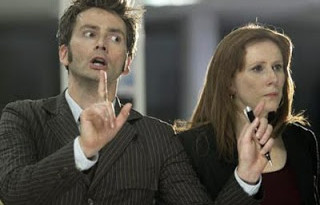Yesterday was Trinity Sunday, and since I’ve recently been doing a lot of thinking trying to understand the trinity better, I agreed to do a short talk on trinity for the evening communion service in church at Mack.
So with some trepidition at tackling such a topic as trinity, but with plenty of prayer, and the help of Philip and Claire, who were leading the service, and Beverley, who together helped me put together and polish the following piece:
What do you think of when you hear the word “trinity”?
Perhaps you think it’s an obscure piece of theology, only for the clever or the keen. Perhaps you think it’s arrogant to even try and understand God. Perhaps you think trinity is important, but can’t see what difference it makes to your life.
Whatever you may think, trinity isn’t an invention of monks who needed to get out more. Trinity isn’t something the Church voted into existence a few hundred years after Jesus was around. And trinity isn’t a mystery we’re not supposed to even try and understand.
Instead, trinity is a way of putting into words what Christians have known all along, that God reveals himself, and we encounter him, as Father, Son and Holy Spirit.
There’s a sense in which trinity is a mystery. God is far, far bigger than we can ever fully understand. But as Daniel said to Nebuchadnezzar, “There’s a God in heaven who reveals mysteries”.
From the beginning to the end of the Bible, God reveals to us that he is both three and one. When Genesis says “In the beginning, God created…” the word for God, elohiym, is plural, while the action created, bara, is singular. Also, God says “Let us make man in our image”. Unity and plurality, right from the beginning.
When we think of God in the Old Testament, we often think of the burning cloud above Mount Sinai. But we also see the Spirit of God come on people. We see God appear as a man, eating with Abraham, wrestling with Jacob, walking in the fiery furnace.
In the New Testament, have you ever wondered why Jesus doesn’t just come straight out and say “I am God”, even though what he says amounts to that? The Pharisees knew it – and tried to kill him. His discipled realised it – and worshipped him. But instead of talking about “God”, Jesus always talks about his relationship with the Father. “I am in him, and he is in me”, “I and the Father are one”.
How do we make sense of all this, then? How do we understand God revealing himself both as one and three?
We try hard to explain the trinity with images we understand, but our images, explanations and comparisons aways fall short. Have you heard the one about the egg? You have the shell, the yolk, and the white, all in one egg. But does this make you want to worship God, comparing him to an egg? Does something we eat for breakfast really show us what God is like?
Father, Son and Spirit aren’t three slices of one divine pie; they aren’t three gods who happen to like each other a lot; they aren’t three different masks God wears one after another.
Trinity, simply explained, is this: God is Father, Son and Holy Spirit loving one another. More than that, God is the love that exists between Father, Son and Spirit.
These three persons are one God, not because all three happen to be made of some kind of “god stuff”, but because these relationships are God. What are those relationships? To use the language of the creeds, the Son is eternally begotten of the Father, and the Spirit proceeds from the Father and the Son. Love and relationships are basic to the very nature and being of God.
This means that love isn’t just another attribute of God alongside his power and knowledge and justice and mercy… All that God is and all that God does overflows uncontainably from the love between Father, Son and Holy Spirit!
Trinity, then, is not an intellectual conundrum, but shows us that our God is a God of love and relationships. Love is the very fabric of the universe. Relationships are fundamental to our human nature.
When we see this, we begin to see how trinity is relevant to everything. If we start reading the Bible and looking at the world more through the lens of trinity, I suspect we’ll be pleasantly surprised how well things come into focus.
But more that that: isn’t our God beautiful? Don’t you just want to love a God who is love? This is the real point of understanding trinity: not to solve theological puzzles, but to worship and delight in God more and more.
To Him be the glory, forever and ever, Amen!
Some of the online resources I found helpful in thinking about trinity include some talks by Mike Reeves from Theology Network and some blog posts on Christ the Truth about the trinity in the Old Testament. eSword was useful, as usual, for Bible study. Some discussions on the Ship of Fools forums in the last couple of months on trinity were also helpful in stimulating my thinking on the subject, and sent me scurrying off to read things like the Athanasian Creed.
If you’ve any feedback, suggestions, criticisms, accusations of heresy and so on, feel free to comment!





